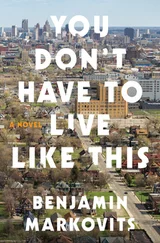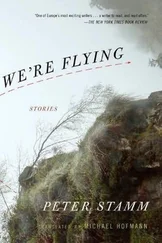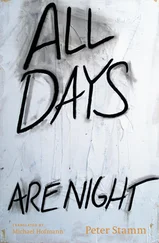“It’s easier like this,” she said.
They made love on the observation platform. The boards were wet and cold. Fabienne took off her jeans and shoes. She pushed up her sweatshirt and her bra, but left on her jacket. She kept her eyes shut, and lay there motionless. She seemed very naked and vulnerable. Andreas was put in mind of police photographs of crime scenes, pale, lifeless bodies by the side of the road, in forests or rushes.
They said good-bye at the parking lot. Andreas got in his car and watched Fabienne put on her seat belt, get into reverse, and drive off. She seemed perfectly calm, as though nothing had happened. Andreas put on his seat belt, but didn’t drive away. It had begun to drizzle, and the landscape was half-obscured from sight. It was cold in the car, and Andreas’s breath made clouds of steam. He thought about Fabienne. He was surprised by the purposefulness with which she had guided his hands, the calmness of her surrender, and her sudden quick pleasure. The whole thing was over in fifteen minutes. Then Fabienne had got a packet of Kleenex out of her jacket, and carefully wiped herself. She seemed very strange to Andreas. It was as though her face had also changed from being naked. He didn’t recognize her until she was dressed again.
He didn’t know what he expected from her. He didn’t even know what he wanted. That she leave her family for him? That she go with him to France, or wherever? That she become his mistress, meet him every other week somewhere, always with a guilty conscience where she was concerned? They would get used to each other, maybe even quicker than two spouses got used to each other, because they wouldn’t share anything but their love.
He hadn’t returned to the village to start a relationship, but to end one, to have certainty at last. If Fabienne had slapped him when he tried to kiss her, either back then or today, he would have gotten over it, as he had gotten over other unhappy relationships. He was concerned to get an answer from her, to know at last whether she loved him, whether she might have been able to love him. But in fact she hadn’t given him an answer. She told him not to call her at home. He asked her how else was he going to get ahold of her. She said she would call him tomorrow.
He ate in the fish restaurant where he had wanted to take Delphine. Earlier, it had been renowned for its good cooking, but he didn’t enjoy the food. It would be nice if Delphine were here, he thought.
He stayed up in his room all afternoon. He hoped Fabienne would call. Suddenly he wasn’t sure whether he had given her the correct room number. Maybe she had forgotten the number, and she was calling reception, and no one was answering.
Fabienne called the next morning, as she had said she would.
“Can we meet up?”
“Manuel and Dominik are flying their hot-air balloon,” she said. “I’m free till twelve.”
“Do you want to meet at the camper?”
“They’ve taken the car.”
They arranged to meet at the hut in the woods where they had first met.
Andreas walked through the village, and through the business district. The sky was clear, except for some little shreds of cirrus clouds. The forecast was for warm weather in the afternoon, but the morning felt cool. It was the first day of autumn, the sky looked suddenly darker, and the air was so clear that everything seemed very close.
Andreas got to the rendezvous too early. There were wet charred branches on the campfire site, and garbage on the ground. The hut belonged to the community, and on the wall, in a little metal frame, was a list of rules. Andreas perused it: garbage in the containers provided, no loud music, no dogs without a leash.
Fabienne came almost exactly on time. Once again, she was wearing the yellow slicker. She propped her bike against a tree. Andreas hugged her, she kissed him on both cheeks.
“Do you want to go for a walk?”
They walked through the forest. It was probably the same path they had taken that night when they played hide and seek. It led on and on in a straight line. In the distance you could see where the forest ended. For a while they walked in silence side by side. Then Fabienne asked Andreas what was in the letter that he had written but not sent.
“That I love you,” said Andreas. “Not much more than that, I think.”
He asked what she would have done if she’d received the letter.
“I don’t know,” said Fabienne. She seemed to be thinking. She said she was really fond of Manuel. They had a good relationship.
“When did it begin, with the two of you?”
“I suppose it was the day you kissed me. He was very attentive. He took me home. I was a bit confused.”
“Ah, if I’d had the car.”
“But nothing happened,” said Fabienne. “We just talked. You were so dismissive, after you’d kissed me. You behaved as though it was nothing. And then you got really aggressive. I told Manuel about your kissing me. We talked about you a long time. That brought us closer. The next day he brought me flowers. We didn’t kiss until much later.”
Andreas said he didn’t suppose he’d ever loved a woman as much as he’d loved her. Fabienne didn’t say anything. They walked slowly through the forest, side by side. Andreas was a little surprised he didn’t feel angry with Manuel, that he didn’t even feel jealous of him. He wouldn’t have wanted to trade places with him. He stopped and pressed Fabienne to himself. He kissed her on the mouth, but she didn’t reciprocate. She hugged him like a good friend, and laid her head against his chest.
“There’s no point,” she said.
“One night,” he said. “Let’s spend one night together. To give us something to remember. Not just those ten minutes.”
“Love lasts for ten minutes,” said Fabienne. “What difference would it make?”
“What made you sleep with me, anyway?”
“I was curious,” said Fabienne, and then, a while later, she couldn’t just stay away from home for a night, she didn’t know what he was thinking of. In the fifteen years she’d been married to Manuel, she had spent very few nights away from him.
“Do you remember our meetings in Paris?”
“I just remember the fact of them,” said Fabienne, with an apologetic smile.
“In the mosque,” said Andreas. “And one time we went to the cinema. The film tore, and they were unable to show us the ending. Someone came up to the front and told us the ending.”
“I don’t remember.”
It was all so long ago, said Fabienne. So much had happened in the meantime.
“Not in my life,” said Andreas.
They had gotten to the edge of the forest, and stopped. The path led on, past the gravel pit, and through fields and meadows to the next village.
“Are you happy?” asked Andreas.
“I’m not unhappy,” said Fabienne. “Let’s go back.”
Andreas said he had the feeling of having done something incredibly stupid that would never be made up for.
“I can still remember writing the letter. I had something to eat in a pizza place near the Opera. It was evening, I was alone, and I started writing in my notebook, about our first meeting, and driving to the lake, and kissing you. Our story. And that I wanted it to continue. If I’d had an envelope and a stamp, I think I might have mailed it to you right away. But the next morning, I no longer dared.”
They were silent. Andreas wondered if the relationship could have lasted. They had both been so young. Maybe he would have made Fabienne unhappy, maybe they would have split up long ago. Or they would still be together, one of those couples that stick together because they’re each so afraid of being alone. They didn’t really fit. At that time, it hadn’t seemed to matter to him. He wanted to convince himself that the only reason his love had lasted so long was because it had remained unrequited. He asked Fabienne what she was thinking. Nothing, she said.
Читать дальше












